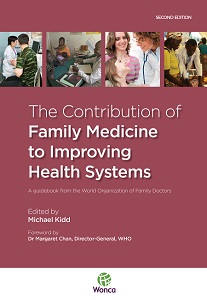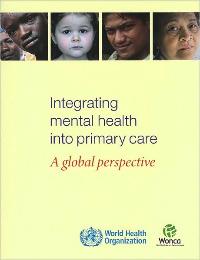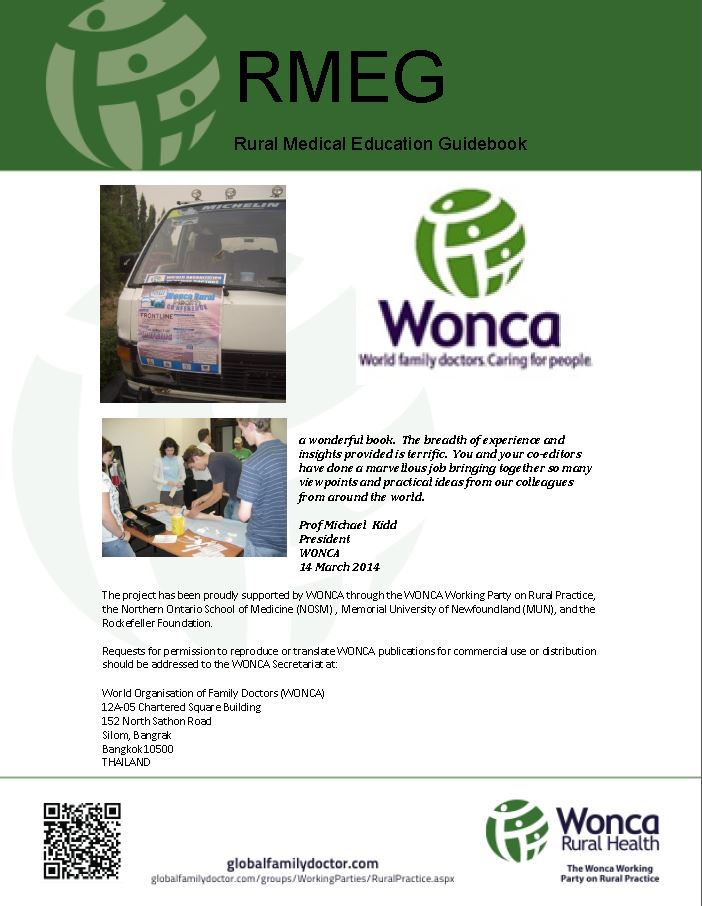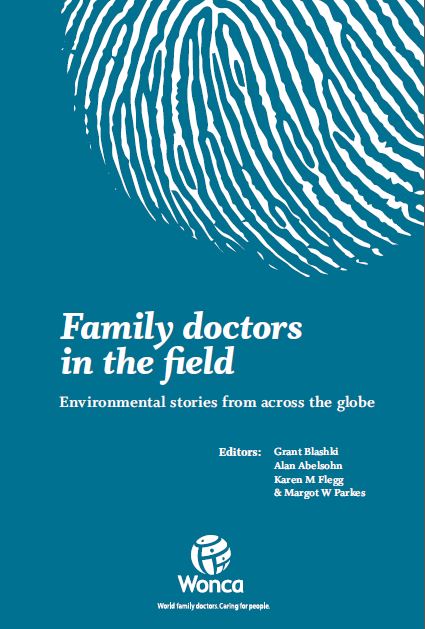From the CEO's desk: WONCA publications
This month I thought it would be useful to remind members about the various WONCA publications, many of which are freely available via the WONCA website, and especially to highlight recent and forthcoming publications.
 The contribution of family medicine to improving health systems
The contribution of family medicine to improving health systems
The mainstay of our catalogue is the WONCA Guidebook – “
The contribution of family medicine to improving health systems”. Edited by our Immediate Past President, Professor Michael Kidd, and with contributions from a number of WONCA members, as well as colleagues from WHO (including a foreword from Dr Margaret Chan, ex-Director General of WHO), the guidebook reveals ways in which family medicine can help countries throughout the world maintain and improve health and well-being by developing a more productive, coordinated and cost-effective approach to healthcare. So critical has this book been considered that it has been translated into many different languages, including: Portuguese; Slovak; and Vietnamese. Copies – in English - are available from the WONCA Secretariat at
admin@wonca.net or from the
on-line shop.
I ntegrating Mental Health into Primary Care: a Global Perspective
ntegrating Mental Health into Primary Care: a Global Perspective
Now one of WONCA’s more mature publications, this was a joint publication between the WONCA Working Party on Mental Health and WHO’s Department for Mental Health and Substance Abuse. World-wide, mental, behavioural and neurological disorders are major contributors to disability and premature death. They are common in all countries, and if left untreated cause immense suffering. Primary care services for mental disorders are the best way of ensuring that people get the mental health care they need. They are accessible, affordable, acceptable and cost-effective and promote early diagnosis, respect of human rights and social integration. They also ensure that all people are treated in a holistic manner, addressing both their physical and mental health needs.
Download here.
 Rural Medical Education Guidebook (RMEG)
Rural Medical Education Guidebook (RMEG)
The WONCA
Rural Medical Education Guidebook was launched at the 12th WONCA World Rural Health Conference, in Gramado, Brazil, in April 2014. The project was supported by WONCA through the WONCA Working Party on Rural Practice, the Northern Ontario School of Medicine, Memorial University of Newfoundland (MUN), and the Rockefeller Foundation.
Consisting of 71 chapters written by 74 authors, it represents a unique collaboration, with contributions from every continent. It is intended to be a free resource for doctors, educators and others wanting to obtain practical ideas on implementing aspects of rural medical education and to learn from the experience of colleagues in different contexts.
Download here.

Family doctors in the field – Environmental stories from across the globe
Family doctors are all too aware of the link between the environment and the health of our patients and our communities. What is good for the environment is also good for our patients – whether it’s clean water, clean air, freshly grown food or the benefits of physical activity. In this publication, Grant Blashki, Alan Abelsohn, Margot Parkes and Karen Flegg have brought together a series of stories from family doctors across the globe, who have taken a step beyond concern and into action. Their enthusiasm, passion and commitment has allowed them to make important and lasting contributions to the health of individuals, communities and their environment. It’s freely available on the
WONCA Website
 International Perspectives on Primary Care Research
International Perspectives on Primary Care Research
This book, edited by Felicity Goodyear Smith (New Zealand) and Bob Nash (South Africa) examines how the evidence base from primary care research can strengthen health care services and delivery, tackle the growing burden of disease, improve quality and safety, and increase a person-centred focus within healthcare. It demonstrates the inter-professional nature of the discipline by featuring a section on cross-nation organizations and primary care networks supporting research. Researchers from 20 countries provide national perspectives, providing case histories from research-rich to research-poor nations to illustrate the range of research development and capacity building.
Available from CRC press
Family Medicine – the Classic Papers

In this book, the editors – Michael Kidd, Iona Heath and Amanda Howe – have endeavoured to collect in one place the classic papers from family medicine from around the world. The book aims to serve as a showcase for some of the most important ideas and research carried out in, or about, family medicine, demonstrate the broad scope of primary health care delivered by family doctors around the world, and serve as an inspiration to current family doctors as well as doctors in training and medical students. With 33 papers, ranging in time from 1894 to 2015, the book is a fascinating history of papers which have profoundly influenced our specialty.
More here.
I’m also delighted to report that, at the 2017 British Medical Association Book Awards, held in London in mid-September, this book was Highly Commended in the Primary Health Care category. Iona Heath and Professor Sir Andrew Haines represented WONCA at the award dinner.
Future publications
In addition to the publications listed above, a further three publications are at various stages of development:
•
“Family Practice in the Eastern Mediterranean Region: Universal Health Coverage and Quality Primary Care” which will be a joint publication between WONCA and WHO Eastern Mediterranean Region Office (WHO EMRO) and edited by Michael Kidd and Hassan Saleh. The region is leading the implementation of universal health coverage and has made the commitment to use primary health care as a key component of this policy. The book answers the need of policy makers in this region, by explaining what primary health care is, how it contributes to cost-effectiveness of health care, and the mechanisms through which it can make a major impact on society and populations’ health. It thus paves the way for effective policy, capturing the evidence and detailing strategies to implement policy under prevailing national conditions.
• “
How To Do Primary Care Research”, edited by Felicity Goodyear Smith and Bob Mash, of WONCA’s Working Party on Research, will act as a companion volume to their recently published “
International Perspectives on Primary Care Research” (as featured above) and will be a great guide to practitioners who would like to get more involved in research in primary care and family medicine.
•
“Primary Health Care around the World: Recommendations for International Policy and Development”. This book will be based on a series of workshops, held at the various WONCA regional conferences, when discussions centred on progress to date and what had facilitated or delayed implementation of PC and family medicine.
Key WONCA documents
I must also mention two other key WONCA documents: “Global Standards for Postgraduate Family Medicine Education” and “Global Standards for CPD Programmes”.
WONCA Global Standards for Postgraduate Family Medicine Education
Medical educationalists from around the globe developed World Federation for Medical Education (WFME) global standards for basic medical education, postgraduate medical education and continuing professional development. Because these standards were developed through a rigorous process and are global in nature and in development, they provided an excellent framework for the family medicine-specific educational standards developed by the WONCA Working Party on Education (WWPE), beginning in 2006. In May 2012, the WWPE was given permission to adapt the WFME standards as a template for the development of standards in Family Medicine Education. This document represents the standards developed by the WWPE for postgraduate family medicine education, and is based on the WFME global standards.
These global standards may be used in a variety of ways, always with the overall goal of quality improvement in Family Medicine Postgraduate Education. Because these standards are intended to be used globally, and in the very diverse contexts in which family medicine is practiced, they are necessarily quite broad in nature. It is intended that they be adapted for the local environment and to meet community needs. Programs might use these standards for:
• Self assessment and program quality improvement
• New program development
• Peer review
• Recognition and accreditation
The full document and standards can be accessed via
the WONCA website.
WONCA Global Standards for CPD Programmes
As with the WONCA Standards for Postgraduate Family Medicine Education, this document is an adaptation of a WFME document - the Continuing Professional Development (CPD) of Medical Doctors: Global Standards for Quality Improvement. These WONCA standards have been modified to fit the requirements of the family doctor and general practitioner, as those of WFME discussed CPD in more general terms. The term Continuing Professional Development (CPD) has been selected for the purpose of this document as it encompasses Continuing Medical Education (CME), dealing with medical knowledge/clinical skills and extends into the wider context of how this learning exists as an interplay between the individual physician and the profession. Specific content areas and learning modalities relevant to Family Medicine are therefore included in the WONCA standards. These standards have been developed over several years, and at world, regional and rural meetings of WONCA. They can be
accessed on line here.
Next month
Next month I will be writing, among other topics, on the call for nomination for WONCA officers for the 2018-2020 biennium, and also the call for nominations for WONCA awards. Of course, we also have a full meeting of the WONCA Executive on 29th and 30th October in Bangkok, and I’ll be reporting back on the issues discussed and the decisions made.
Until next month.
Dr Garth Manning
CEO